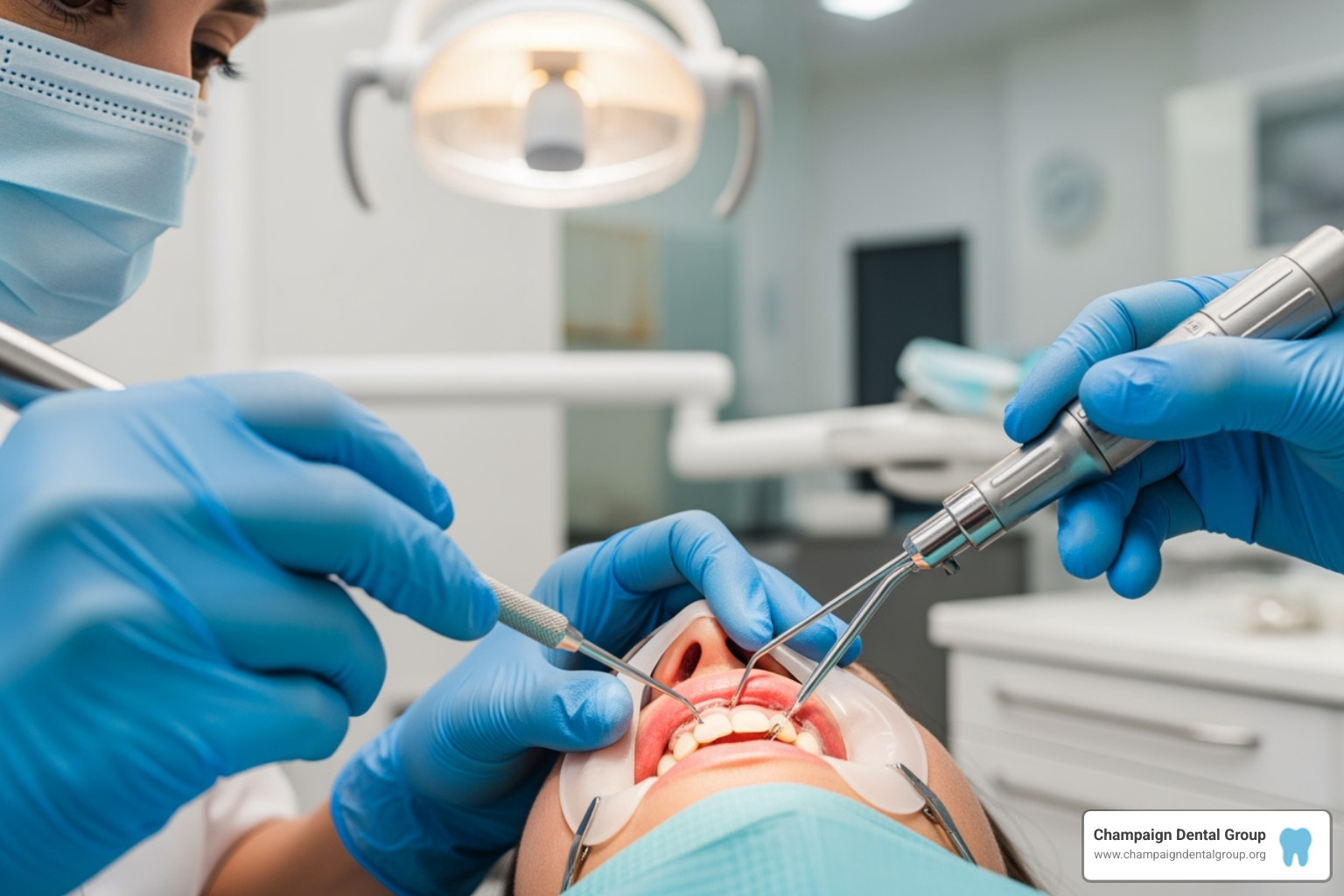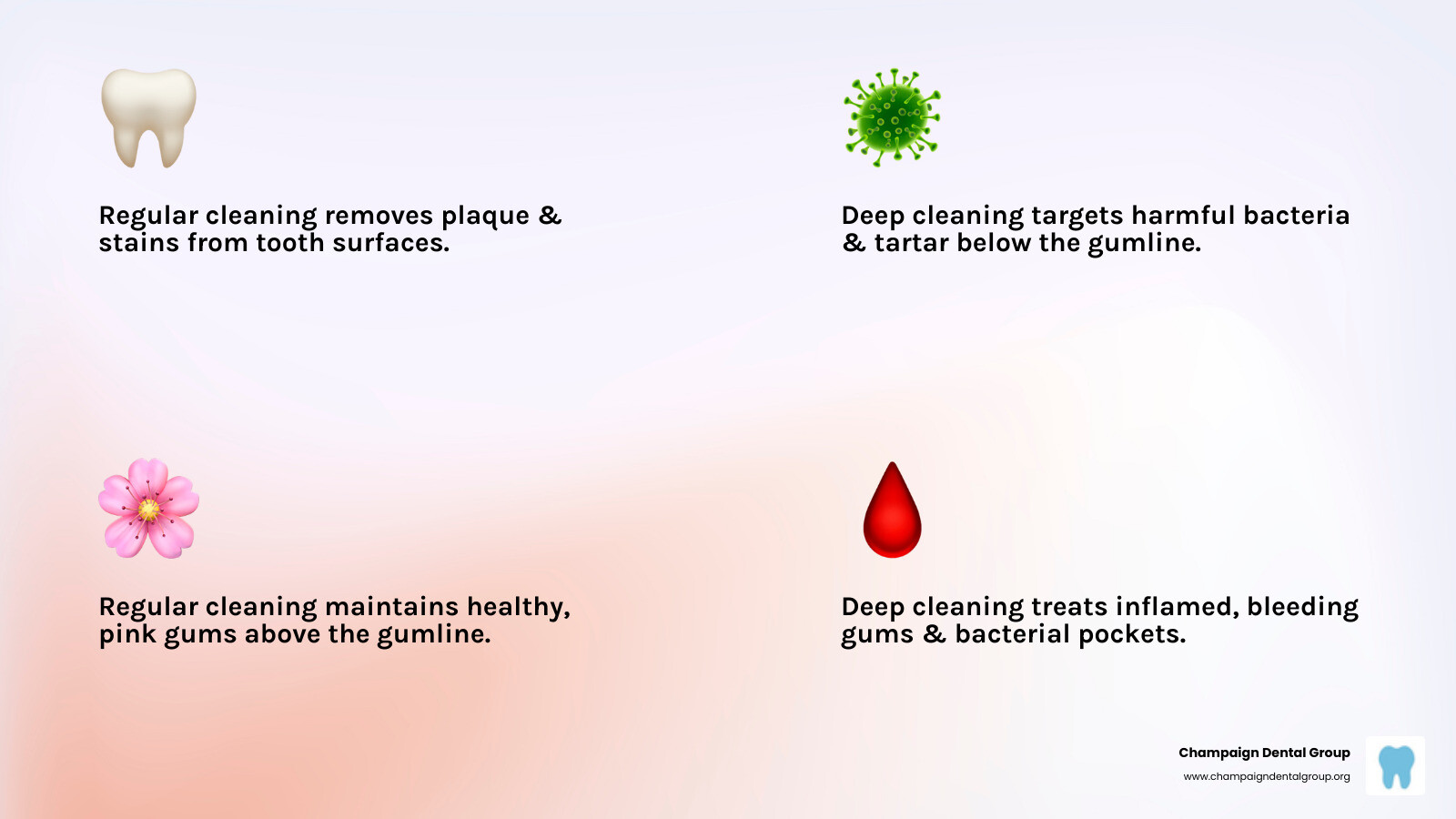Is a Dental Deep Cleaning Right for You? A Comprehensive Guide

Understanding Deep Cleaning for Your Oral Health
Deep cleaning teeth, also known as scaling and root planing, is a therapeutic dental procedure that removes plaque and tartar buildup from below the gumline to treat gum disease and prevent tooth loss.
Quick Answer: What You Need to Know About Deep Cleaning
- Purpose: Treats gingivitis and periodontitis by removing bacteria below the gumline
- Procedure: Two-step process involving scaling (tartar removal) and root planing (smoothing tooth roots)
- Duration: Typically 1-2 hours per visit, often completed over 2 appointments
- Who needs it: Patients with gum pockets deeper than 3-4mm or signs of gum disease
- Recovery: Mild sensitivity and tenderness for a few days, with follow-up in 4-6 weeks
If your gums bleed when you brush or if your dentist has mentioned "pockets," you might need this more intensive cleaning.
The numbers are significant: approximately 47.2% of adults aged 30 and older in the U.S. have some form of periodontal disease, rising to over 70% in those over 65. This suggests nearly half of all adults may benefit from deep cleaning at some point.
Unlike a regular cleaning (prophylaxis) which maintains healthy gums, deep cleaning is a therapeutic treatment for active gum disease. It targets harmful bacteria below the gumline, in areas your toothbrush and floss can't reach.
At Champaign Dental Group, our experienced team provides compassionate, high-quality patient care with state-of-the-art technology. We provide clear information to help you make the best decisions for your family's oral health.

Regular Cleaning vs. Deep Cleaning: What's the Difference?
Understanding the difference between a regular and a deep cleaning teeth procedure is crucial. While both clean your teeth, they serve very different purposes.
A regular cleaning (prophylaxis) is preventive maintenance. Our skilled hygienists at Champaign Dental Group remove plaque and tartar from the visible surfaces of your teeth (supragingival cleaning) to maintain oral health and prevent future problems.
Deep cleaning teeth (scaling and root planing) is a therapeutic treatment for active gum disease. It reaches deep into periodontal pockets to remove bacteria and tartar from below the gumline (subgingival areas) and smooths tooth roots to promote healing.
Here's a clear comparison to help you understand the key differences:
| Feature | Regular Cleaning (Prophylaxis) | Deep Cleaning (Scaling & Root Planing) |
|---|---|---|
| Purpose | Preventive care; maintain healthy gums | Therapeutic treatment; treat active gum disease |
| Target Area | Above the gumline and slightly below (supragingival) | Deep below the gumline, into periodontal pockets (subgingival) |
| Plaque/Tartar Removal | From tooth surfaces and visible areas | From tooth surfaces and deep within gum pockets |
| Root Surface | Not typically addressed | Smoothed to remove bacteria and encourage gum reattachment |
| Anesthesia Use | Generally not needed | Often uses local anesthetic for patient comfort |
| Procedure Goal | Prevent gum disease, maintain oral hygiene | Halt gum disease progression, reduce inflammation, prevent tooth loss |
| Frequency | Typically every 6 months | Initial procedure, followed by more frequent periodontal maintenance |
For more detailed information about our comprehensive approach to oral hygiene, visit our Teeth Cleaning services page.
When is a Regular Cleaning Enough?
If your gums are healthy (pink, firm, and don't bleed), regular six-month cleanings are likely sufficient. These visits are ideal for those with good home care and minimal plaque. During a regular cleaning at Champaign Dental Group, our compassionate team removes plaque and tartar from above the gumline and polishes your teeth. Polishing removes stains and creates a smoother surface that's harder for plaque to stick to.
Regular cleanings are preventive, helping you avoid gum disease and cavities. Our experienced hygienists use state-of-the-art technology for a thorough, comfortable cleaning. These appointments also allow us to monitor your oral health and catch potential issues early. Learn more about the benefits of routine care in our article about The Importance of Regular Dental Check-Ups: Beyond Cleaning.
Why You Might Need to Go Deeper
Sometimes, bacteria get below the gumline where regular cleaning can't reach. This is when deep cleaning teeth becomes necessary to treat gingivitis or periodontitis.
Gingivitis is the early, reversible stage of gum disease, where gums become red, swollen, and bleed easily.
Untreated gingivitis can progress to periodontitis, a serious condition where deep pockets form between gums and teeth. These pockets harbor bacteria and tartar that home care cannot remove. We measure gum pocket depth during your exam; healthy pockets are 1-3 mm deep. Pockets deeper than 4 mm indicate an infection below the gumline that requires a deep cleaning to prevent further damage.
Without treatment, deep pockets can lead to bone loss and tooth loss. Early intervention with deep cleaning is key to controlling the infection and promoting healing. For more information, read our detailed guide on Plaque and Tartar Removal.
Signs and Symptoms: Do You Need a Deep Cleaning?
Gum disease can be subtle and painless initially, which is why regular check-ups at Champaign Dental Group are so important. Our team is trained to spot early signs you might miss. During your exam, we measure gum pocket depth with a small probe. Healthy pockets are 1-3 mm deep; deeper pockets signal gum disease. We may also take X-rays to check for bone loss and get a complete picture of your oral health.

While we're experts at spotting early signs, there are several symptoms you might notice at home that could indicate you need a deep cleaning teeth procedure:
- Gums that bleed easily during brushing or flossing. Healthy gums shouldn't bleed.
- Red, swollen, or tender gums. Healthy gums are pink and firm.
- Persistent bad breath (halitosis) that doesn't resolve with brushing or mouthwash.
- Gums pulling away from teeth (recession), which can make teeth look longer.
- Loose or separating teeth, which can occur as supporting bone deteriorates.
- Pus between your teeth and gums, a sign of an active infection that requires immediate attention.
Catching these signs early makes treatment more effective. If you experience any of these symptoms, please call us. Our compassionate team has served Champaign families since 1997 and is here to guide you toward the best solution for your individual needs.
The Deep Cleaning Teeth Procedure: Scaling and Root Planing Explained
If our team at Champaign Dental Group recommends a deep cleaning teeth procedure (scaling and root planing), we ensure you are fully informed. This therapeutic treatment is a methodical process that cleans much deeper than a regular cleaning.
Your comfort is our top priority. We begin by applying a local anesthetic to numb the treatment area, ensuring a comfortable experience. For a thorough and comfortable procedure, we often complete the treatment over two visits, focusing on one or two quadrants of your mouth per session. Each appointment typically lasts one to two hours.
Our team's commitment to high-quality patient care and state-of-the-art technology is a core part of our Preventive Dentistry philosophy.

Step 1: Scaling
The first phase, scaling, is the careful removal of plaque and tartar from above and below your gumline. Our skilled dental hygienists use two main tools: ultrasonic scalers, which use high-frequency vibrations and water to break up deposits, and hand instruments for precise, detailed removal. This debridement clears out the bacteria causing gum disease, giving your gums a fresh start. According to the American Academy of Periodontology, non-surgical periodontal treatment like scaling is highly effective at halting the progression of gum disease.
Step 2: Root Planing
After scaling, we perform root planing. Gum disease can make tooth root surfaces rough, creating hiding spots for bacteria. During root planing, we smooth these root surfaces. This makes it harder for plaque to reattach and encourages your gums to heal and reattach firmly to your teeth. This process is crucial for reducing periodontal pocket depth, making them shallower and easier to clean at home.
Special Considerations for Your Deep Cleaning Teeth
We always conduct a thorough consultation to discuss your unique health situation before your deep cleaning teeth procedure. This personalized approach is part of our commitment to the compassionate, high-quality care we've provided in Champaign since 1997.
- Orthodontics: If you have braces or Invisalign attachments, our experienced team has the specialized tools to clean around them effectively.
- Health Conditions: Your overall health is important. Conditions like diabetes or heart conditions can affect treatment, and we will discuss any necessary precautions with you to ensure your safety.
- Medications: If you take blood thinners (e.g., Warfarin, Eliquis), we may coordinate with your physician to adjust your dosage, minimizing bleeding risk. Your safety is our top priority.
Benefits, Aftercare, and Long-Term Outlook
A deep cleaning teeth procedure is an investment in your oral and overall health. The most significant benefit is halting the progression of gum disease. By removing harmful plaque, tartar, and bacteria, we reduce inflammation and infection. Patients often notice healthier, more comfortable gums within weeks.
Crucially, this procedure helps prevent tooth loss. Untreated gum disease destroys the bone supporting your teeth, but a deep cleaning stops this destructive process. Many patients also find their persistent bad breath disappears. Your gums will become healthier, returning to a firm, pink state. Beyond oral health, healthy gums contribute to overall systemic health, making this a proactive step for your total well-being. Maintaining an excellent at-home routine is essential to maximize these benefits, as detailed in our guide to a Good Oral Hygiene Routine.
Post-Procedure: What to Expect and How to Heal
After your deep cleaning teeth procedure, it's normal to experience temporary sensitivity and tenderness as your mouth heals. This is manageable and usually resolves within a week.

Our compassionate team will provide detailed homecare instructions. General guidelines include:
- Stick to soft foods like yogurt, soup, and smoothies for a few days.
- Avoid hot and cold foods/drinks due to potential sensitivity.
- Brush gently with a soft-bristled toothbrush; a desensitizing toothpaste can help.
- Use saltwater rinses (a teaspoon of salt in warm water) to soothe gums.
- Over-the-counter pain relievers like ibuprofen can manage any soreness.
We will schedule a follow-up appointment in 4-6 weeks to check your healing. Most patients respond very well to treatment, and good home care leads to rapid improvement.
Potential Risks and Side Effects
While deep cleaning teeth is very safe, our experienced team at Champaign Dental Group will discuss potential side effects with you so you feel fully prepared. The most common side effects are temporary tooth sensitivity, minor bleeding, and tenderness. You may also notice some gum recession as inflammation subsides, which is a positive sign of healing. The risk of infection or nerve damage is extremely low with our team.
Long-Term Maintenance for Lasting Health
Your deep cleaning teeth procedure is the first step toward lasting oral health. After deep cleaning, we recommend more frequent periodontal maintenance cleanings, typically every 3-4 months. These visits allow us to monitor your gums and remove any new plaque and tartar.
Your commitment to home care—daily brushing and flossing—is crucial. This partnership between you and our team at Champaign Dental Group is the key to exceptional long-term results. Most people respond very well to scaling and root planing. With consistent care, you can maintain healthy gums and protect your smile for decades, a key part of the 7 Benefits of Having a Regular Dental Check-Up.
Frequently Asked Questions about Deep Cleaning Teeth
How much does a deep cleaning teeth cost and is it covered by insurance?
Understanding the cost of a deep cleaning teeth procedure is important. The cost varies based on the extent of your gum disease and the number of quadrants (sections) of your mouth requiring treatment.
The good news is that most dental insurance plans provide partial coverage for deep cleaning, as it's a medically necessary treatment. At Champaign Dental Group, our compassionate team helps you understand and maximize your insurance benefits. For those without insurance or seeking predictable costs, we offer Champaign Dental's Smile Protection Plan to make treatments more affordable. We believe in cost transparency and will discuss all options with you upfront, so you can make the best decision for your health and budget. For more on costs, see our guide on Plaque Cleaning Cost.
Is the deep cleaning procedure painful?
We understand concerns about pain. The good news is that a deep cleaning teeth procedure should not be painful. We administer a local anesthetic to completely numb the treatment area. You may feel gentle pressure or vibration from our state-of-the-art instruments, but not pain. Our team at Champaign Dental Group prioritizes your comfort and will check in with you throughout the procedure. After the numbness wears off, some mild tenderness or sensitivity is normal for a few days and can be managed with over-the-counter pain relievers.
Can gum disease be reversed with a deep cleaning?
Whether a deep cleaning teeth procedure can reverse gum disease depends on its stage, but the outlook is very encouraging.
In its early stage, gingivitis, a deep cleaning can completely reverse the condition. By removing plaque and tartar, we allow the gums to heal fully.
If the disease has progressed to periodontitis, bone loss has occurred and cannot be reversed. However, a deep cleaning is crucial because it can completely halt the disease's progression. By removing bacteria, we control the infection, stop further bone loss, and allow your gums to become healthier and firmer. The key is early detection and consistent maintenance care. Our comprehensive approach at Champaign Dental Group helps most patients achieve remarkable improvements in their gum health.
Your Path to Healthier Gums Starts Here
Understanding if a deep cleaning teeth procedure is right for you is an important step toward better oral health. It's about getting professional guidance to make the best decision for your smile. The benefits are significant: halting gum disease, reducing inflammation, and preventing tooth loss. For the many adults with gum disease, deep cleaning is the key to restoring oral health.
Only a professional diagnosis can determine if you need a deep cleaning. Since 1997, our experienced team at Champaign Dental Group has provided compassionate, high-quality patient care to families in Champaign County. We use state-of-the-art technology to provide accurate assessments and comfortable treatment.
Don't ignore signs like bleeding gums, persistent bad breath, or swollen gums. Our comprehensive evaluations can catch issues early. We treat every patient like family, explaining your options clearly and ensuring you're comfortable with your treatment plan.
Your journey to healthier gums starts with a simple conversation. We're here to listen and guide you.
Don't let gum disease compromise your smile or your overall health. Schedule your comprehensive dental hygiene appointment today with Champaign Dental Group, and let us help you take that important first step toward optimal oral health.

.jpg)